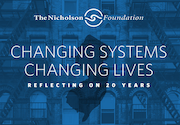Site Search
- resource provided by the Forum Network Knowledgebase.
Search Tip: Search with " " to find exact matches.
Grantmakers Concerned with Immigrants and Refugees (GCIR) in collaboration with National Committee for Responsive Philanthropy (NCRP), present a briefing that features a panel of speakers representing nonprofit organizations working on the front lines to strengthen our democracy and advance immigrant rights in their communities. Don’t miss this opportunity to hear what groups need as we move into 2025 and beyond, directly from movement leaders.
According to a report from National Committee for Responsive Philanthropy, since 2012 there has been an 11 percent shrinkage in philanthropic funding towards immigrant movement groups. While there was an uptick in rapid response funding between 2017-2018, this has not created the conditions for the long term sustainability of immigrant serving organizations.
In a critical election year, over 60 anti-immigrant bills have been introduced in state legislatures nationwide. Immigrant advocacy groups – already facing a myriad of historically systemic challenges such as burnout, unlivable wages, and hostile state level political environments – are facing this wave of anti-immigrant sentiment, often at the sacrifice of their own safety and well being. And while philanthropic interest has focused on the national elections and scenario planning, movement groups are already planning for 2025 and an uncertain future regardless of presidential election outcomes. Philanthropy must not only meet this moment but also invest in the critical infrastructure needs of organizations and movements, particularly at the local and state levels.
As right wing movements seek to undermine our democracy on all fronts, immigrant communities cannot be left behind and must be included in any political, social, or philanthropic efforts that seek to build a multi-racial democracy. Built through the collaborative efforts of GCIR and NCRP, this briefing will feature a panel of speakers representing nonprofit organizations working on the front lines to strengthen our democracy and advance immigrant rights in their communities. Don’t miss this opportunity to hear what groups need as we move into 2025 and beyond, directly from movement leaders.
Cost: Free for Funders
Must log in or create an account to register on GCIR’s website.

Newark is one step closer to its highly anticipated Guaranteed Income Pilot Program following the release of a report by the city, the Jain Family Institute and the Economic Security Project outlining findings and recommendations that would put more cash into residents’ hands.
Mayor Ras Baraka first broached the idea of a universal basic income pilot program at a 2019 State of the City address, saying it would be a welcome experiment in Newark, where more than a third of residents live below the poverty line. Universal basic income is a government benefit that aims to reduce income inequality through direct cash infusion.
More than a year later, the report completed by the city’s special task force is positioning Newark to join a national body of research on guaranteed income. The pilot program would focus specifically on residents struggling with housing insecurity, according to the city.
“What we really want to do is add to the national body of research and put Newark on a national stage,” said Kevin Callaghan, Newark’s philanthropic liaison. “This is Mayor Baraka entering a conversation and saying this is something that we support, and the top recommendation of the report is that there should be a federal guaranteed income policy.”
With the support of JFI and ESP, two internationally recognized research groups, Newark will begin to cast a line to national foundations and donors to fund the pilot. The report estimates anywhere between $4.5 million to $12 million based on three studies, but Callghan put the sweet spot around $5 million for meaningful results.
Estimates say that a Newark family would need $63,000 a year to meet its basic needs, according to United Way of Greater Newark.
This report from the TCC Group finds that the flexibility, nimbleness, and willingness to collaborate demonstrated by the philanthropic sector over the past year in response to a rapidly changing policy environment could serve as a model for the sector going forward.
Based on interviews with nearly thirty leaders of philanthropy-serving organizations (PSOs), this report found that in the first year of the Trump administration, PSOs and funder collaboratives were called on to keep funders well informed of policy changes. To that end, PSOs have played a critical role in enabling funder learning, dialogue, and action, and have helped accelerate important funder conversations in the areas of diversity, equity, and inclusion; the need to think beyond issue silos; and the foundational benefits of creating space for dialogue across political and ideological divides through nonpartisan civic engagement.
The report also notes that while some funders have remained cautious, taking a "wait and see" approach to how national political changes might affect their grantmaking priorities, a greater number have been moved by rapidly changing policies to consider aligning their "institutional voice" with other grantmakers to maximize their impact.
